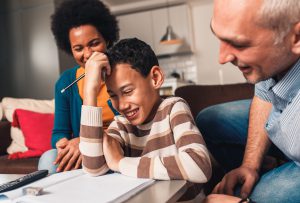Using Mindfulness to Maintain Calm at Home
Between nationwide school closures, hundreds of companies transitioning to teleworking, and many parts of the country in lockdown with “shelter in place” announcements in response to the spread of the novel Coronavirus, parents across the country are now having to juggle their jobs plus the full-time education, care, and development of their children.
Not being able to go outside and play, visit friends, or go to sports or school can be challenging for kids who thrive on those connections and routines to make sense of the world around them. The presence of an unknown virus that scares adults can also bring up difficult emotions for children, who perhaps haven’t yet learned to regulate or communicate about them.
Use your breath as a tool to help you navigate through stressful times with our 7 Days of Relaxation Techniques on-demand content!
Mindfulness – bringing focus to the breath or body sensations and noticing your thoughts and feelings – can help both you and your kids be present with each other, while also encouraging you to bond and openly talk about your feelings. While this may seem like a complicated idea to teach to kids, there are many activities for kids at home to not only introduce them to mindfulness, but do it in fun, educational, and creative ways.

Quarantine Activities for Kids to Support “Physical Distancing”
Parents and teachers across the country have come together to help each other homeschool and support kids’ education and development during this time of isolation and adding mindfulness activities for children can help supplement their self-awareness, emotional growth and social connection.
No matter what age group you have at home, mindfulness activities can be an enjoyable part of the day that can help reframe the idea of social distancing into an opportunity to build a deeper connection with yourselves and each other while staying safe, and even continue after this time of self-quarantine ends.
Mindfulness home activities can help teach:
- Observation
- Listening
- Awareness
- Patience
- Gratitude
Hone your observation and awareness skills by tuning into our Mindful Dailysessions!

Activities for Younger Kids
Bringing mindful awareness to our thoughts and feelings is a healthy behavior at any age. Some examples of mindfulness activities for younger age groups are:
- Going on Safari. Create a safari indoors with stuffed animals, plants, paper cutouts, or whatever else you have on hand to transport you and your little learner to the jungle. On your safari together, talk about what you see, smell, touch, and hear.
- Making Emotions Discovery Jars. Fill empty plastic jars or bottles with water, glitter, food coloring, or whatever you have on hand, making each jar a different color. With face stickers or markers, create faces that correspond with different emotions. Disney’s movie “Inside Out” is a good model for this game with Joy, Sadness, Anger, Fear, and Disgust. Use the bottles to communicate to your child how you’re feeling that day, and have them do the same.
- Pinwheel or Bubble Breathing. Hold a pinwheel or a bubble wand. Taking deep breaths in with slow breaths out, move the pinwheel or fill the bubble, teaching your child to have awareness of their breath.
- Mindful Snack Time. Practice eating more mindfully together by sharing a snack together and talking about the textures, flavors, colors, and smells that you’re experiencing. Also recognize who helped make this snack possible for you, such as the farmers who grew the apples, the truckers who shipped those apples to the store, and the produce worker who stocked those apples for you to buy.
- A Positive Thoughts List. Make a list together of people you want to send positive thoughts to, whether it’s people you know or people in other areas of the world.
Having trouble falling asleep? Our Mindful Sleep Meditations series can help!
Activities for Teenagers
- Mystery Songs. Choose a random song on YouTube, Spotify, or Apple Music that you nor your child has heard before. Without looking up the artist or the lyrics and without judging the song based on its genre or title, focus on just listening to it together and observing whatever thoughts or feelings come up as you’re listening. Discuss your reactions to the song.
- Gratitude Journals. Dedicate some time for quiet reflection and writing down what you’re grateful for – try to list 5-10 things. Then come together and discuss. This can work as a one-time activity with your older kids or as a daily ritual that you can all look forward to as a family.
- The Mindful Word Game. Each person thinks of one word that seems soothing to them, such as “peace” or “tranquility.” Think the words to yourselves, silently and slowly inside your mind. Say your word to yourself with each breath in and out and keep your attention focused on it. If your mind wanders, gently bring it back to your word. Can you both do this for one full minute? How about five minutes?
- Walking With Your Senses. You’ve all walked around your house dozens of times a day, but have you really noticed and observed it? Take turns walking from room to room and writing down one thing you can smell, see, hear, touch, and taste in each one. Compare to see if you made similar observations and if you noticed a detail you hadn’t really ever paid attention to before.
- Create a Self-Care Routine. Self-care is important as an adult, and as your teenager is shaping their own identity and habits, now is a great time to formalize a routine that they can return to for their own peace of mind. Sit down and bounce around ideas with them to help them create a routine, either morning, evening or both that they can stick to. It can be as simple as having a cup of chamomile tea each night before bed, or drinking a full glass of water when they wake up in the morning to hydrate.
The Importance of Self-Care During Coronavirus
In addition to taking care of your family, your home, and your job, it’s critical during this time to also take care of yourself. Bringing your kids into your mindfulness practice and doing awareness activities together can help you both stay present and engage in active, open communication and bonding. And when your kids see you taking care of yourself, they will want to take care of themselves, too.
Parenting can continue to be a challenge as you juggle multiple roles. Get some extra support with our 7 Days of Mindful Parenting Part 1 and Part 2 on-demand content!
Written by Becky Greiner.


